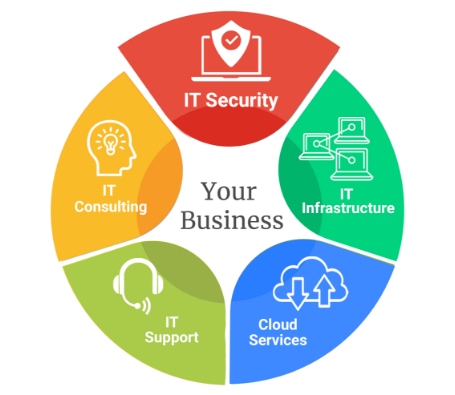
The Five FoundationServices of Managed IT
IT Security
Just what is IT Security? This is our rather long (but thorough!) definition: IT Security is the technology, processes, training, and best practices designed to protect and recover internet-connected systems including networks, devices, programs, and data from cyberattacks, damage, or unauthorized access.
The goal of Adept’s security program is simply to protect and defend your intellectual and confidential assets.
As you can see in the graph below, the services list is long in this category. Why are there so many protections? Because there are so many points of entry available to hackers. Each service plays a vital role in protecting your data, which in turn can protect your business from liability, financial loss, and a ruined reputation.
Adept Solutions Managed IT Services
IT SecurityProtect the integrity, confidentiality and availability of your data |
Included | Add-on Option |
|---|---|---|
| Acceptable Use Policy
What it is: An Acceptable Use Policy outlines what is and is not acceptable use of your company's technology resources. We work with you to create an agreement specific to your company. Your employees are required to read, sign off on, and be accountable for this information. Why you want it: Your AUP can protect your company's reputation and help you avoid financial loss and legal action. |
||
| Backup and Disaster Recovery
What it is: Backup and Disaster Recovery restores lost IT operations and data. By proactively monitoring the success of your backups, we ensure restoration is available at any time, for any reason. Adept requires the use of our backup solutions that moves data to an offsite and secure location. Why you want it: You can rest assured that lost data will be restored and work disruptions minimized. |
||
| Cloud Security
What it is: Cloud Security protects your cloud-based systems, data, and infrastructure. Policies, controls, and procedures work together to protect your cloud-based systems from leakage, theft or data loss. Why you want it: Cloud security measures help protect your data and your customer’s privacy. |
||
| Data Security
What it is: Data Security ensures the integrity and privacy of your data in storage and transit. Intentional or accidental destruction, modification, or disclosure of your data can be prevented with admin and logical access controls such as identification and authentication. Why you want it: Security protocols help protect your information from unauthorized access and protects privacy. |
||
| Endpoint Security
What it is: Endpoint Security protects your network and data when accessed by users. We secure laptops, tablets, smartphones and other wireless devices with firewalls, antivirus, and intrusion detection tools. Providing visibility to web usage and enforcing acceptable web use policies also helps to secure endpoints. Enterprise mobility management provides security for mobile devices and applications. Why you want it: Layers of security help protect data when you are at the office or on the go. |
||
| User Management
What it is: User Management limits and controls employee access to data. This includes assigning security levels that determine access limits to documents, controlling data sharing and managing an employee’s third party or vendor access. We also manage the onboarding and offboarding of your employees. Why you want it: This security helps protect data from user error, mismanagement or intentional harm. |
||
| Network Security
What it is: Network Security protects your network traffic by controlling incoming/outgoing connections. This includes support for firewall devices, patch management, antivirus, anti-spyware, ransomware, anti-malware, intrusion prevention, content filtering, spam filtering, security policy management, and VPN management. Why you want this: These layers of security help guard your network and reduce risks to your data. |
||
| Security Awareness Training
What it is: Security Awareness Training educates your team on IT security best practices. Human error is the leading cause of data breaches. Phishing simulations test your employee’s ability to identify suspicious emails, online training courses teach security best practices; reports identify problems and progress. Training for remote workers is included. Dark Web scans alert you to compromised credentials. Why you want it: Simulations and lessons increase your employees’ awareness of cybersecurity and decrease the risks of data breaches. |
||
| Wireless Security
What it is: Wireless Security ensures security on a wireless network. Tools and protocols specific to securing data while on your wireless network are enabled. Why you want it: These precautions minimize potential exploitation while using your wireless network. |
||
| Security Operations Center
What it is: A SOC extends beyond the cybersecurity we provide for all partners. It includes an additional arsenal of security tools and focused time by cybersecurity analysts devoted to staying ahead of potential threats and pinpointing weaknesses in defenses already deployed. Complying with company, industry and government regulations is also a significant part of a SOC. Why you may want it: A SOC can provide advanced security measures for your business. |
||
| Encryption Services
What it is: Encryption Services encodes data to render it unintelligible. This includes managing the policies, procedures, and enforcement of encryption for data at rest and in transit. Why you may want it: Encryption is available to partners who must meet compliance regulations and to those who desire an extra measure of security. |
